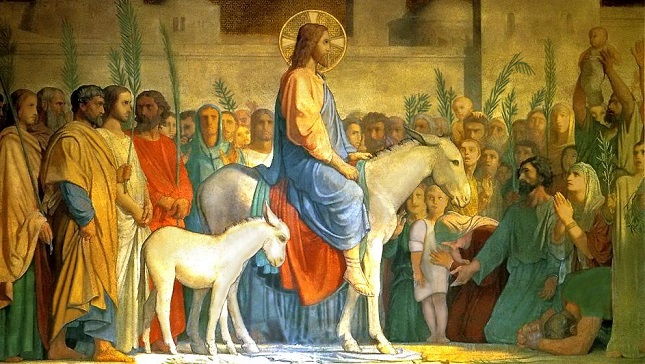Holy Baptism of D.S. Grohn
Readings: John 12:12-19 | Philippians 2:5-11 | Matthew 27:11-54
Text: John 12:12-19 (Procession Gospel)
Many of our favorite English translations label this section the “Triumphal Entry.” But this term can be somewhat misleading. The Evangelist doesn’t call this a triumphal entry, because it isn’t one…yet. It definitely has the features of the triumphal entry of a king returning from war. But there’s something missing: there has been no great battle yet, there are no captives, and the King is riding not on a horse, but on a donkey. Suffice to say, this is not the kind of triumphal entry the crowds were expecting.

They welcomed Jesus because they had seen the signs He had been doing: the raising of Lazarus from the dead (John 11), the healing of the man born blind (John 9), the feeding of the 5,000 (John 6), and the healing of the lame man at Bethesda (John 5). Yet all of these were signs of why Jesus had come into the world. The crowds were often blinded by the brightness of these signs, so that they were disheartened when Jesus spoke of His true identity as God’s Son, and what the Son would do to save this world.[1]
The crowd that journeyed the two miles from Bethany to Jerusalem was not misplaced in their hopes for healing, forgiveness, and resurrection—“Hosanna! Blessed is he who comes in the name of the Lord, even the King of Israel!” These are all things which God has promised to His redeemed people. But the crowds were not expecting how Jesus would bring all of that about. John even admits that the disciples didn’t grasp the full significance of Jesus entry into Jerusalem, until after He was glorified by His death and resurrection (12:16).
Jesus would bring triumph, but not before being rejected by all His people (even His own disciples), suffering at the hands of the chief priests and Roman soldiers, lifted up on a cross to bleed and die. And all of this was beyond the understanding of the crowds.
What they could see was that Jesus was a King, very similar to Solomon, the direct son of David. His entry into Jerusalem paralleled Solomon’s, as it says in 1 Kings 1:
38Zadok the priest, Nathan the prophet, and Benaiah… had Solomon ride on King David’s mule and brought him to Gihon. 39There Zadok the priest took the horn of oil from the tent and anointed Solomon. Then they blew the trumpet, and all the people said, “Long live King Solomon!” 40And all the people went up after him, playing on pipes, and rejoicing with great joy, so that the earth was split by their noise.
The people hoped that just as Solomon unseated the illegitimate king Adonijah, so Jesus would unseat Herod Antipas. They hoped for the restoration of Israel as a powerful nation. They had hoped that this Son of David, Jesus, would restore the earthly land of Jacob to Israelite power.

Yet, by nature, none of us hopes for the sort of King that Jesus really is. Later in Holy Week, Jesus would tell Pontius Pilate that He really is a King, but “My kingdom is not of this world. If my kingdom were of this world, my servants would have been fighting, that I might not be delivered over to the Jews. But my kingdom is not from the world.”[2] Jesus does not conquer lands, rain down fire on His enemies, or make the streets run with their blood. His reign is established through servanthood, as Isaiah wrote,
Behold, my servant shall act wisely; he shall be high and lifted up, and shall be exalted. As many were astonished at you— his appearance was so marred, beyond human semblance, and his form beyond that of the children of mankind— so shall he sprinkle many nations; kings shall shut their mouths because of him; for that which has not been told them they see, and that which they have not heard they understand.5
What kind of King would suffer such torment from His servants, and on behalf of His servants? Yet, this is the sort of King who Jesus is. But all of these things remain hidden until God makes them known to men. As Isaiah wrote in the next verse, “Who has believed what he has heard from us? And to whom has the arm of the LORD been revealed?”[3]
In eight days’ time, God would make it clear how His servant King was to triumph. By the light of the Holy Spirit, God would open the disciples’ eyes to see Jesus’ triumph and where His Kingdom is established.
Jesus truly is the “King of Israel,” as the crowds cried out on Palm Sunday. Yet He’s different from every previous king. Even Solomon, whose reign enjoyed peace, had to shed blood of wicked men. But under the reign of King Jesus, He sheds His own blood for the wicked. His rule is not temporal and it does not end in His death, as all the other kings’ rule had. In fact, His rule begins with His sacrificial death for the people, and continues in His resurrection forever and ever.

The past kings of Israel were successful based on how much of the inherited land they controlled. Yet the land which King Jesus wins for His people is not part of this decaying, cursed world. The inheritance which He wins for His faithful is the new heavens and the new earth, which shall never pass away or be taken away by force. The rule of King Jesus has begun even now, not in countries with borders, but in human hearts. Jesus says you enter His Kingdom when you are “born of water and the Spirit”[4] in Baptism. He promises that whoever thus “believes in Him shall not perish but have eternal life.”[5] And the Evangelist John sums up His entire Gospel by saying, “these are written so that you may believe that Jesus is the Christ, the Son of God, and that by believing you may have life in his name.”[6]
All of the spoils and benefits of God’s Kingdom come through the Son being offered up on the cross, the true Passover Lamb for our sins. In eight days’ time, Jesus Christ will be declared victor over the devil, victor over sin, and victor over the grave. That is His triumph and everyone who hopes in Him will never be put to shame.[7]
You who now believe in Him share in His triumph. His victory is certain and His Kingdom shall last forever. It is for you and for your children. His eternal victory has been gifted to young Dorothea, even though in and of herself she is weak and sinful. This victory has been delivered in humble means, but with the certain and powerful Word of God. You are born from above, of water and the Spirit, baptized into His death and resurrection, so that you can take up this taunt:
“Death is swallowed up in victory.”
55“O death, where is your victory?
O death, where is your sting?”
56The sting of death is sin, and the power of sin is the law. 57 But thanks be to God, who gives us the victory through our Lord Jesus Christ.[8]
In the Name + of Jesus. Amen.

[1] Controversy arose in John 5:18-47, John 6:22-66, John 8:31-59, John 9:8-41, and John 11:45-57
[2][2] John 18:36
[3] Isaiah 52:13-15, 53:1
[4] John 3:5
[5] John 3:16
[6] John 20:31
[7] Psalm 119:116
[8] 1 Corinthians 15:55-57












